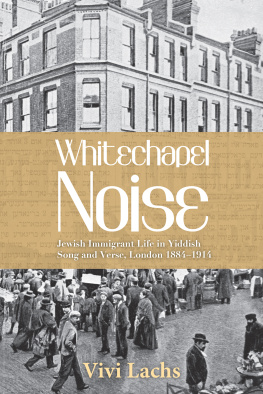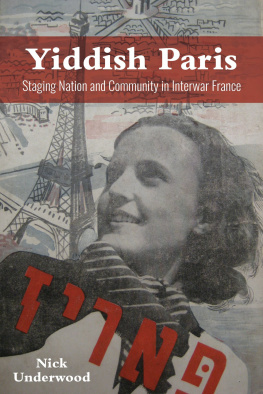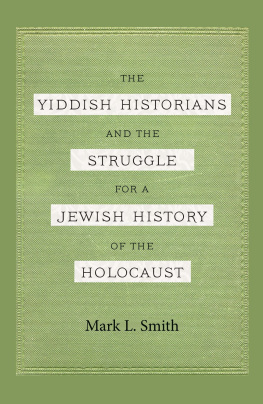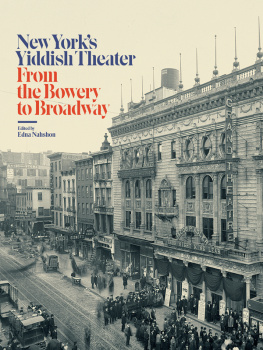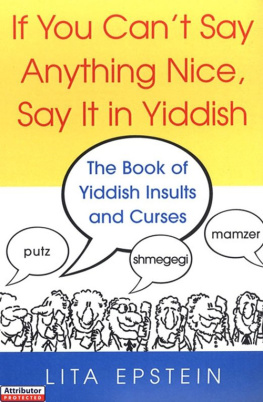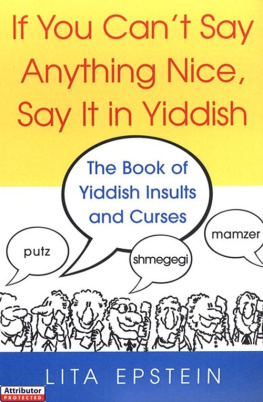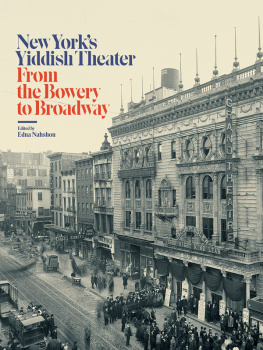
2018 Vivi Lachs. All rights reserved.
No part of this book may be reproduced without formal permission.
Manufactured in the United States of America.
ISBN 978-0-8143-4488-0 (hardcover) | ISBN 978-0-8143-4355-5 (paper)
ISBN 978-0-8143-4356-2 (e-book)
Library of Congress Control Number: 2017960708
Publication of this book was made possible through the generosity of the Bertha M. and Hyman Herman Endowed Memorial Fund.
Wayne State University Press
Leonard N. Simons Building
4809 Woodward Avenue
Detroit, Michigan 48201-1309
Visit us online at wsupress.wayne.edu
This book is dedicated to the memory of my father, Henry Lachs, and my grandmother Manya Lachs, who brought Polish Yiddish into my life and whose constant presence within me infuses these pages.
It is also dedicated to David Cesarani, who supervised my PhD on which this book is based and who sadly passed away just before my viva.

Cover of the Londoner kupletist, ca. 1903. Advertising one hundred new concert and theatre songs sung in London and published by the London Actors Society. From the collections of the National Library of Israel.
Contents
Illustrations
Acknowledgments
This book is the product of a number of years of research. My interest in Yiddish songs about London started me on a journey that led to performing, composing, and scholarship. Many people helped me along the way, and I am truly grateful for their encouragement, support, criticism, and love.
This book developed from my doctoral thesis, and I am grateful to my wonderful supervisors. To the late David Cesarani, who was enthusiastic about this project and hugely supportive with his tough criticism, warm encouragement, and valuable insights. I miss him greatly and feel very fortunate to have worked with him. This book is dedicated to his memory. To Rachel Beckles Willson for her guidance into the world of ethnomusicology, for taking on this project with such interest, and for her incisive comments that enlarged the scope of my thinking. I also want to thank David Feldman and Shirli Gilbert, who so meticulously examined my thesis, have been encouraging and supportive in my writing this book, and continue to advise. I am very grateful to the Royal Holloway history and music departments, which provided the academic environment for this research; for the financial support of a Royal Holloway history scholarship award, for funding Yiddish language courses, conferences, and for generous Friendly Hand grants for archival trips abroad. Thanks to the late Louise Forsyth and Hannah Davis for hospitality and conversation while I was researching in New York.
I am grateful to the patient and knowledgeable archivists who helped me find material and made useful suggestions: Fruma Mohrer, the late Chana Gordon Mlotek, Gunnar Berg, Ettie Goldwasser, Leo Greenbaum, Lorin Sklamberg from the YIVO archive, the informative librarians in the YIVO Library, Zmira Reuveni at the National Library of Israel, Chris Rawlings at the British Library, Chana Pollack from the Forward/Forverts Archives, the Klau Library, record archivist Michael Aylward, and song collector Derek Reid.
of this book are a development on two articles, and I am grateful to Shane Nagle and the Association for the Study of Ethnicity and Nationalism (ASEN) and Daniel Renshaw of Socialist History for suggesting that I talk at their conferences, which led to my publishing the articles in their journals. I would also like to warmly thank Sarah Glazer for inviting me to give a Ruth Gay lecture at YIVO.
I am particularly grateful to my informal academic community of friends who gave their time and expertise to read chapters and give me detailed comments, broad challenges, and lots of ideas, in particular Sarha Moore, Nadia Valman, and Davina Cooper, and the late Sheila Shulman, Didi Herman, Adam Sutcliffe, Zoe Weiman-Kelman, Denis Paz, Ben Gidley, Abbi Wood, Rachel Pistol, and Penny Florence.
A hartsikn dank to my community of Yiddishists, both academic and not, who talked over ideas, corrected Yiddish, gave detailed feedback on chapters, advised, suggested, and encouraged: David Mazower, who shared his private collection of London-Yiddish songsheets, books, and manuscriptshis wide knowledge of London Yiddish popular culture, his criticism, and his friendship have been hugely appreciated; Khayke Beruriah Wiegand, for her meticulous expertise in language and transliteration; and my wonderful fellow Yiddishists Ester Whine, Ellen Cassedy, Miryem-Khaye Seigel, Sima Beeri, Barry Davis, Itzik Gottersman, Haya Vardi, Michael Wex, Eve Sicular, and Chaim Neslen. The Ot Azoy Yiddish course in London has been a part of my Yiddish language development, and I am grateful to Helen Beer, Heather Valencia, and Sonia Pinkusowitz.
Many friends and family talked through ideas, read sections, gave me new perspectives through their questions, and advised on religious contexts. My sister Jude Lachs was a meticulous reader. Edith Lachs and Nicky Lachs listened to hours of my translations of gems from the archives in Jerusalem. I also thank Dave Rosenberg, Marion Brady, the late Rhona Schein, Gabriel Ellenberg, Julia Doyle, Ruti Lachs, Nic Pollinger, Shimmy Lopian, and Stuart Lachs. Also my Facebook friendsTomas Wdski, Shane Baker, Michael Alpert, Daniel Zylbersztajn, Judy Waldman, Esther Grinfeld, Michael Pertz, and Ross Bradshawwho have been a great source of advice on idiomatic Yiddish expressions.
My musical community has inspired me by encouraging me to find new material and compose music, and has worked with me on new ways to perform Yiddish songs of London. I would like to lovingly acknowledge the late Adrienne Cooper, and to thank Karsten Troyke, Klezmer Klub, Tantsunlid, Katshanes, and all those in the Great Yiddish Parade. I have been supported and encouraged to focus on this work over the years by the Jewish Music Institute, and would particularly like to thank Geraldine Auerbach, Jennifer Jankel, Gil Karpas, and Noa Lachman.
Finally, I am delighted to be publishing with Wayne State University Press, and would like to thank my editor, Kathy Wildfong, for the enthusiastic support and advice she has given me. Also Lisa Stallings, Rachel Ross, Emily Nowak, Erin Davis, Ellen Lohman, the people at Westchester Publishing Services, and the two anonymous reviewers of my book for their insightful and helpful comments.
Transliteration of the Yiddish and Pronunciation Guide
Yiddish is written right to left using the Hebrew alphabet. This alphabet is not reproduced in this book, and the Yiddish mostly appears according to the standard YIVO transliteration system. The words sound as below.
| Looks like | Sounds like |
| a | as in art |
| ay | as in spy |
| e | as in empty |
| ey | as in brain |
| i | as in pin |
| o | as in lost |
| u | as in spoon |
| kh | as in chutzpah |
| dzh | as in jelly |
| zh | as in the French je |
Unlike in English, the e is pronounced on the end of a word. So you hear the final vowel in drite (third).
There are some exceptions to the YIVO system. The poetry and song texts have a variety of nonstandard spellings. When these do not affect the sound, they have been standardized in the transliteration. However, they are written as they sound when they reflect different styles of speech and dialect, theatre pronunciation, and anglicized words. I have tried to be faithful to the Yiddish; thus the transliteration comes with a number of caveats:
Next page
